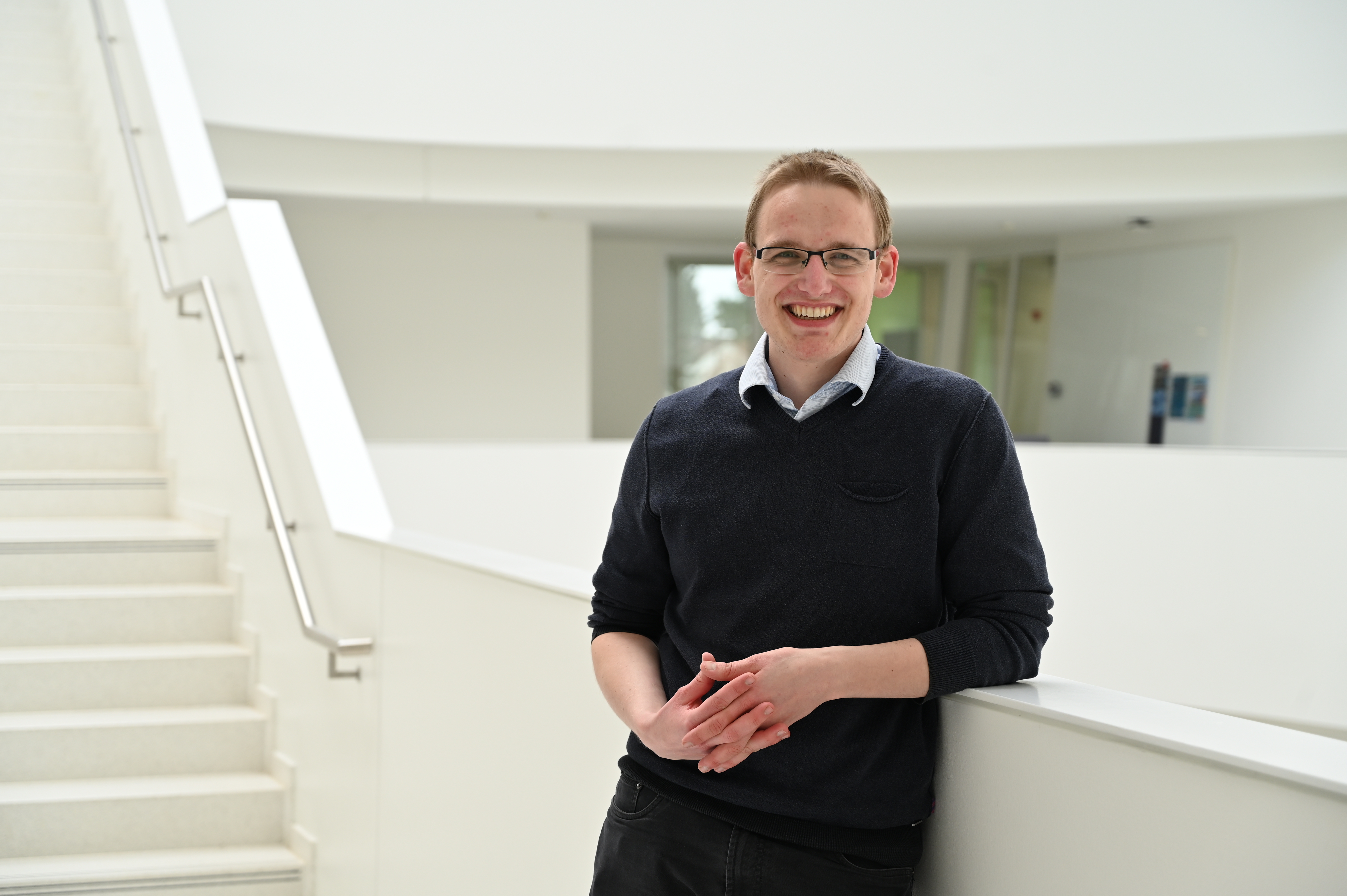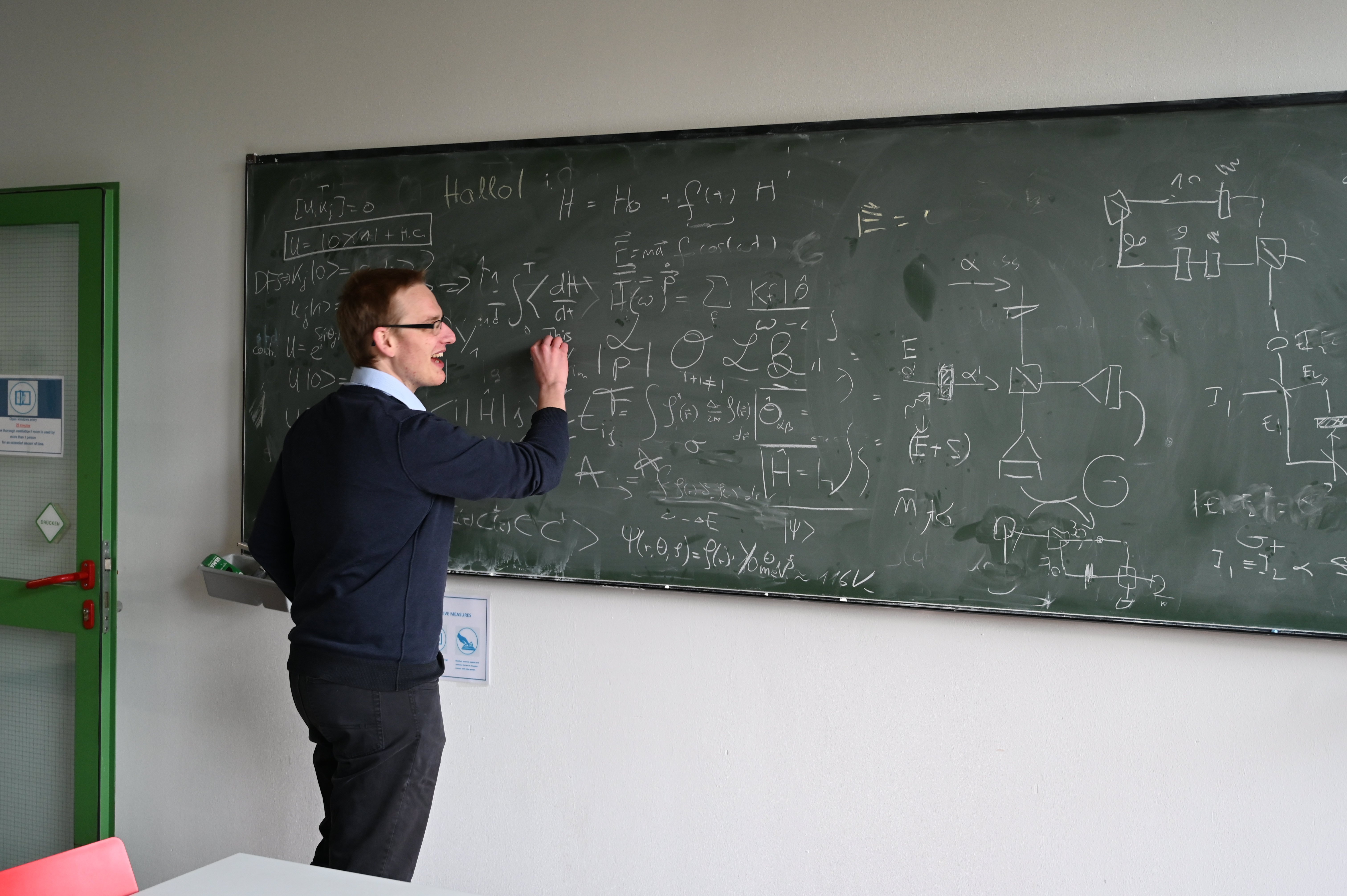"Physics is like real magic for me"
Exploring how the world works
Understanding reality and playing an active role in shaping it is what drives Timo Eckstein. For this reason, he is developing quantum algorithms for the computing of the future in his doctoral studies. Besides, he likes to defuse tricky situations – as a spokesman for the doctoral researchers at FAU as well as in the volunteer fire department.
By Veronika Aechter
Fully scribbled blackboards and scientific posters alternate on the corridor walls of the Chair for Quantum Theory at the Friedrich Alexander University of Erlangen-Nuremberg (FAU). In a room on the top floor, Timo Eckstein sits in his office and looks intently at the screen. The 28-year-old is a doctoral student in Prof. Michael J. Hartmann's group, and the second paper in his doctoral program has just been published as a preprint.
The fact that physics is only on the curriculum from the seventh grade onwards is something Timo finds a pity. "In elementary school, you get religion lessons starting in first grade, but the natural sciences don't come along until later. In my opinion, that would be a good way to get children interested in nature and technology at an early age," says the Ph.D. student. For him, it also has a lot to do with a general understanding of reality: "Fantasy story versus reality, so to speak." He admits that this is, of course, a very absolute statement; everyone should believe in what they want – but he still believes that a basic education in the natural sciences is very important for society, also in view of current debates about climate change, for example.
For Timo, this also includes making science education accessible to people from different backgrounds who have so far been underrepresented in research. For example, for children whose parents don't have a university degree: "It would be good if you could get them excited about science while they're still at school." As a pupil, he himself took part in the Netzwerk Teilchenwelt, a project in which young people can gain insights into particle physics. As a student, he later passed on his knowledge in the same project. At the moment, he wants to set up something similar for quantum mechanics. For him, getting involved in science communication has the added benefit of testing his own knowledge: "If I can't explain what I'm doing to someone with less prior knowledge, I have to think again about whether I really understood it myself."
Explorer in the quantum world
The interest in how reality works is what drives Timo. Especially in quantum physics, which motivates him to question his intuition and understanding of reality and to expand his horizons. "For me, physics is a bit of real-world magic," Timo waxes lyrical. "Creating more knowledge from existing knowledge is something I find very fascinating." The subject of quantum in particular, he says, is like a hidden world: "Like a world map of knowledge and you can play Columbus a bit yourself," he says, and his enthusiasm to play a small part in discovering this world is clear.
Specifically, for him that means determining in his research whether a particular quantum algorithm is actually more advantageous than its classical counterpart, or what conditions would have to exist in the future for it to be advantageous. To do this, he studies quantum assembly algorithms. He draws a comparison with the development of classical computing, explaining that we are currently in the "assembler era" of quantum computing. At the moment, researchers are trying to select each individual quantum operation in an optimal way in order to achieve a reasonable result in spite of errors. "I really enjoy not being tied to today's hardware and being able to work on ideas for which quantum hardware may be sufficiently developed in five or ten years," he adds.

Timo Eckstein, 28
Position
Ph.D. student
Institute
FAU – Chair for Quantum Theory
MPL – IMPRS
THEQUCO
Degree
Physics
Timo is studying quantum assembler algorithms in his research. He wants to find out under which conditions a quantum algorithm has advantages over a classical algorithm. He numerically computes new algorithm ideas or improvements for small systems before testing them with classical high-performance hardware and finally quantum hardware for larger scaled quantum systems.
In his current project, the Ph.D. student was able to follow his algorithm idea through numerical demonstrations to hardware demonstrations. "Having this complete workflow was very interesting," Timo recounts. "It's also very informative to understand what today's hardware is already capable of." And in this case, it went pretty well: "Our algorithm still didn't seem to be quite maxed out at 20 qubits on real ion trap hardware," he says happily.
When Timo talks about his research, he also talks a lot about the quantum community. It is this team spirit that he believes also makes good results possible in the first place. Collaborations are especially important for experiments and projects that are becoming increasingly complex – "today, it reads like an address book in some cases," Timo says, laughing. He also values the collaboration with other quantum researchers at FAU and as part of Munich Quantum Valley. The appointment of scientists from the field of quantum computing to professorships, partly within the framework of MQV, was an argument for him to stay in Erlangen for his doctorate.
Staying calm when the heat is on
Team spirit is also important to the doctoral student outside of university. In his free time, he is active in the volunteer fire brigade – for him, the ideal balance to his doctorate: "I think it's great that people from all kinds of backgrounds come together with a common goal: to help people in emergency situations. It also gets him out of his academic bubble and teaches him to be sensitive to many different perspectives. His volunteer work also helps him with his stressful everyday life at university: "Firefighting has taught me to be more relaxed in stressful situations. If you don't stay calm, you've already lost."
Besides his doctorate and the fire department, there is hardly any time left for other hobbies, as the doctoral student is also active in other volunteer roles related to the university. Since 2021, for example, he has been the spokesperson for the graduate student representative committee. "I think it's important to do a little bit of something else besides your doctorate," he says. "Other people do sports. I simply get rid of my excess energy standing up for the rights of doctoral students," he says with a laugh. He is particularly concerned about the working conditions of doctoral students. He compares doctoral studies to social professions: Many work from a sense of conviction and are not paid appropriately – and precisely because of that. "But if you want the best researchers, you have to offer the best working conditions," he says, summarizing his concern and emphasizing that adequate remuneration is also a crucial tool for keeping top researchers in Germany.
He is currently trying to slowly reduce his involvement in the International Association of Physics Students (IAPS) and the Young German Physics Society (jDPG). But Timo definitely wouldn't want to miss the excursions and events within IAPS in particular. "It was always cool to meet students from all over the world. You just got along really well because you shared this interest in physics. The ICPS (International Conference of Physics Students) was really special when I was a student." His favorite memory of these events, he said, was an international cookout night where everyone brought something from their own home region. "My classic was always Obazda," says Timo. "It's simple, and you had a pretty good selection of cheeses everywhere. I did it in Los Alamos too, but the cheese was $15 – it was a golden Obazda!"
"Often there is a good portion of luck involved"
BMBF Scholarship, FAU Leonardo College, ESRF/ILL Summer School, FAU Bachelor Award, Fulbright Scholarship, Erasmus Scholarship, finalist of the Rhodes Scholarship, Germany-wide Master Award, LANL Summer School – the list of awards and scholarships the doctoral student was able to collect is long. "Being selected for the summer school in Los Alamos made me especially happy. Not least because other talented people applied for all these things and would have been just as deserving," says Timo. "There is always a bit of luck involved, too." In addition, he simply applied for a lot of things: "The things that didn't work out in the end aren't on your resume, of course. The failures are just as much a part of it." Keeping that in mind is also particularly important in terms of one's own mental health: "If you only ever see what's going great for everyone else, it drag you down. It's good to be aware that these are the things that have worked out. Everything else is just not part of the story."
Timo's biggest recommendation for other prospective scientists: As early as possible, at the latest during the master's program, start thinking about whether and where you would like to do your Ph.D. – and if possible, write your master's thesis there. He himself wrote his master's thesis in the field of laser physics and only later came to Prof. Michael J. Hartmann's chair. "In terms of people and motivation, the chair was a great fit for my master's thesis. It was also exciting from a subject point of view. In retrospect, however, I may not have given it enough thought. Today, I see a lot of advantages in staying with the master's thesis chair for the doctorate; in a way, you have a year's head start. You know the culture and the people." He very much appreciates the fact that Hartmann has nevertheless placed his trust in him. So if students are interested in his department, they are welcome to get in touch: "We always have exciting topics waiting for good people.
Published on 25 August 2023; Interview on 19 April 2023
